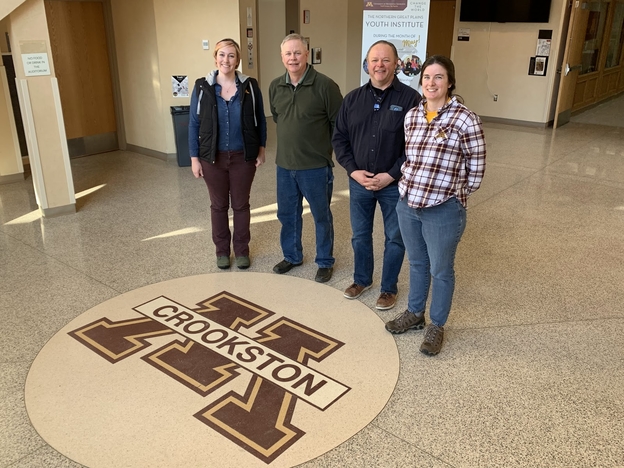
CROOKSTON, Minn. - Within the last few weeks of winter, Sustainability Coordinator and Associate Professor of the University of Minnesota Crookston Katy Chapman along with Lindsay Peace (NW Research & Outreach Center) wrote and secured a grant from the Minnesota Department of Agriculture. With the help of farm cooperators Craig and Brian LaPlante, their efforts were rewarded as they secured the grant with their project titled Farming Practices for Improved Soil Health. With the bulk of the research taking place on the LaPlante farms near Fisher, Minn., the scope of Chapman’s project was to find more sustainable agricultural practices while improving soil health and longevity.
With the abundance of nutrient rich lands in the Midwest, healthy soil has been taken for granted. Luckily, Chapman and Peace did not overlook the outlying issues that await the future of farm to table foods. “Ever since the invention of the plow, soil health has been declining. If we continue to let it decline, our ability to feed future generations will disappear. Preserving soil health is a really important thing to be working on” said Chapman. With the help of a couple outside perspectives, the research process will be focusing on tillage, herbicide applications, fertilizer use, and evaluating their impact on yield. Not only will this make soil more viable, says Chapman, but it will also improve the food being harvested and provided.
When asked about how this project came about, the future of agriculture was the main concern of the project team. Of course the long term quality of soil was the centerpiece, but what was also mentioned was the technological advancements that are already among us. Autonomous tractors for instance, that are powered by solar energy that don’t require manual operation, use shallow-tilling methods to avoid herbicide application. Which of course leaves healthier soil and in part more efficient agricultural operations.This project is really aimed at figuring out how to utilize this new technology when it becomes available and how we can implement these changes in traditional agriculture in a sustainable way to protect soil, says Chapman.
Starting this summer, with the help of a few on-campus students, Farming Practices and Improved Soil Health will be a 2-year funded project. Entering her 14th year with the Crookston campus, Chapman is more than eager to put her knowledge and experience to the task. Raised by biologists, Chapman has had a long drawn-out career in plants and sustainability before gracing U of M Crookston with her expertise. Chapman found her niche while in her undergraduate program doing a number of projects and experiments. Phytoremediation being the gateway to her field of study (the process of using plants to clean up contaminated environments, how fitting.)
From phytoremediation during graduate school at Purdue University to using buffer strips to protect water conservation during her post-doc at Umass Amherst, and learning about greenhouse gas emissions at the Agriculture Research Service in Auburn, Alabama. Chapman highlights the framework for sustainability across the University of Minnesota and across the world. It all falls under the United Nations 17 Sustainable Development Goals in which the Farming Practices and Improved Soil Health project addresses quite a few. Zero hunger, good health and well being, quality education, and responsible consumption and production to name a few. Chapman states “This is the guiding framework to achieve maximum sustainability, If we can tie our project to these, it’s a win.”
Among the many classes Chapman teaches, Sustainable You, Sustainable World stands out the most. A course where students of any major can apply their field of study to the United Nations Sustainable Development Goals and find their own ways to create a more sustainable community.
Pictured below from left to right: Lindsay Peace, Craig LaPlante, Brian LaPlante, and Katy Chapman



